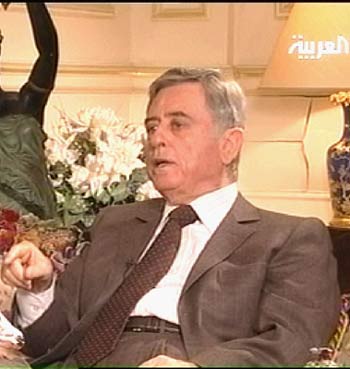
Former Syrian vice-president Abdel Halim Khaddam speaks during an exclusive interview with the Dubai-based Al-Arabiyya channel (AFP)
DAMASCUS (AFP) – Syria’s parliament called for the country’s former vice president to face treason charges after he publicly accused President Bashar al-Assad of threatening Rafiq Hariri just months before Lebanese ex-premier’s murder.
“We appeal to Justice Minister Mohammed Ghafri to bring Abdel Halim Khaddam before justice for high treason and to take the necessary measures,” said speaker Mahmud al-Abrash.
The parliament passed the motion unanimously calling for a trial during a regular session in which several lawmakers accused Khaddam of “treason” and “corruption” for his remarks, which dealt a new blow to Assad’s regime.
“I demand, in my own name and the name of the people, that Khaddam is judged because he has attacked the dignity of Syria and humiliated millions of Syrians,” said MP Umeima Khudur.
Khaddam, long the architect of Syria’s military and political domination of neighbouring Lebanon, made his explosive claims in an interview with Dubai-based Al-Arabiya television.
“I will destroy anyone who tries to hinder our decisions,” Khaddam quoted Assad as telling Hariri during a meeting in Damascus.
Khaddam, speaking from Paris where he and his family now live, said the meeting took place a few months before the February 14 assassination of Hariri in a Beirut bomb blast for which a UN probe has implicated Syrian intelligence.
“We must await the results of the investigation, but no Syrian security service could take such a decision unilaterally,” Khaddam said.
Abrash said he had been bombarded with phone calls from Syrians demanding that Khaddam be arrested by Interpol.
“(Khaddam) is the despicable face of the old guard which closed political forums in Syria and threw their members into jail,” said the Islamist representative in parliament, Mohammed Habash.
The murder of Hariri, a billionaire businessman and five-time prime minister, plunged Lebanon into political turmoil and heightened international pressure on Syria to end its 29-year military presence in its smaller neighbour.
“The battle of Damascus, the battle of the regime has begun,” predicted a Lebanese MP from the anti-Syrian majority who asked not to be named, while pro-Damascus newspaper Ad-Diyar branded Khaddam “Syria’s Judas.”
Khaddam said he had advised Hariri to leave Lebanon “because his situation regarding Syria had become complicated” in the wake of the threat.
“But, of course, at no time did it occur to me that Syria could assassinate Hariri,” Khaddam said.
In March, Syria denied a report from a UN fact-finding mission that Assad had threatened Hariri and Druze leader Walid Jumblatt if they opposed the policies of Damascus.
Mehlis said in an interview with an Arab newspaper in mid-December he was convinced that Syria was responsible for Hariri’s murder.
Khaddam also pointed a finger of blame for tensions in Lebanon before the Hariri murder at Rustom Ghazaleh, Syria’s military intelligence chief in Lebanon before its troop withdrawal.
In an interview with CNN in October, Assad vehemently rejected any notion he had played a personal role in the Hariri assassination.
Assad, whose country has repeatedly denied any involvement in the murder, said he had only found out about Hariri’s assassination “from the news … in my office” and that any Syrian found guilty should be punished.
In the Al-Arabiya interview, Khaddam, 73, also announced the reasons for his resignation at a Baath party congress in June and his break with the regime.
He said he was “convinced that the process of development and reforms, be they political, economic or administrative, will not succeed” and preferred to choose “the motherland” over “the regime”.
“I have many things to say, serious things, when the time is right,” he said, adding however that his relationship with Assad remained “amicable”.
Khaddam, who long served Bashar’s father Hafez before his death in 2000, was also close to former interior minister Ghazi Kanaan, for 20 years Syria’s intelligence chief in Lebanon, who committed suicide in October.

Lebanese men watch Syrian Vice-President Abdel Halim Khaddam in a wide ranging interview with the Dubai-based Al-Arabiya television (AFP)

June 2005 picture of Syrian President Bashar Assad (L) and Vice-President Abdul-Halim Khaddam, as they observe a minute of silence for late Syrian President Hafez Assad at the Regional Conference of the Baath party. (EPA)
